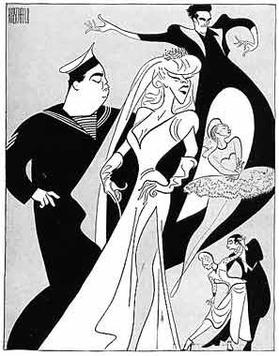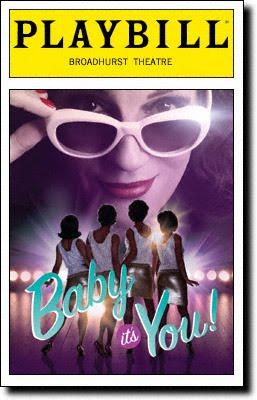Kander and Ebb were a highly successful American songwriting team consisting of composer John Kander and lyricist Fred Ebb. Known primarily for their stage musicals, which include Cabaret and Chicago, Kander and Ebb also scored several movies, including Martin Scorsese's New York, New York. Their most famous song is the theme song of that movie. Recorded by many artists, "New York, New York" became a signature song for Frank Sinatra. The team also became associated with two actresses, Liza Minnelli and Chita Rivera, for whom they wrote a considerable amount of material for the stage, concerts and television.

Chicago is a 1975 American musical with music by John Kander, lyrics by Fred Ebb, and book by Ebb and Bob Fosse. Set in Chicago in the Jazz Age, the musical is based on a 1926 play of the same title by Maurine Dallas Watkins about actual criminals and crimes on which she reported. The story is a satire on corruption in the administration of criminal justice and the concept of the "celebrity criminal".

Annie is a musical with music by Charles Strouse, lyrics by Martin Charnin, and a book by Thomas Meehan. It is based on the 1924 comic strip Little Orphan Annie by Harold Gray. The original Broadway production opened in 1977 and ran for nearly six years, setting a record for the Alvin Theatre. It spawned numerous productions in many countries, as well as national tours, and won seven Tony Awards, including for Best Musical. The musical's songs "Tomorrow" and "It's the Hard Knock Life" are among its most popular musical numbers.
A cast recording is a recording of a stage musical that is intended to document the songs as they were performed in the show and experienced by the audience. An original cast recording or OCR, as the name implies, features the voices of the show's original cast. A cast recording featuring the first cast to perform a musical in a particular venue is known, for example, as an "original Broadway cast recording" (OBCR) or an "original London cast recording" (OLCR).
Morris Isaac "Moose" Charlap was an American Broadway composer best known for Peter Pan (1954), for which Carolyn Leigh wrote the lyrics. The idea for the show came from Jerome Robbins, who planned to have a few songs by Charlap and Leigh. It evolved into a full musical, with additional songs by Jule Styne and Betty Comden and Adolph Green. The original run of Peter Pan on Broadway starred Mary Martin as Peter Pan and Cyril Ritchard as Captain Hook.

Joseph Edward Levine was an American film distributor, financier, and producer. At the time of his death, it was said he was involved in one or another capacity with 497 films. Levine was responsible for the U.S. releases of Godzilla, King of the Monsters!, Attila and Hercules, which helped revolutionize U.S. film marketing, and was founder and president of Embassy Pictures.
Eddie Lawrence was an American monologist, actor, singer, lyricist, playwright, artist, director and television personality, whose comic creation, "The Old Philosopher," gained him a cult following for over five decades.
Norman Gimbel was an American lyricist and songwriter of popular songs and themes to television shows and films. He wrote the lyrics for songs including "Ready to Take a Chance Again" and "Canadian Sunset". He also co-wrote "Killing Me Softly With His Song". He wrote English-language lyrics for many international hits, including "Sway", "Summer Samba", "The Girl from Ipanema", "How Insensitive", "Drinking-Water", "Meditation", "I Will Wait for You" and "Watch What Happens". Of the movie themes he co-wrote, five were nominated for Academy Awards and/or Golden Globe Awards, including "It Goes Like It Goes", from the film Norma Rae, which won the Academy Award for Best Original Song for 1979. Gimbel was inducted into the Songwriters Hall of Fame in 1984.

William Morrison Charlap is an American jazz pianist and educator.

Paul Frederick Jabara, was an American actor, singer, and songwriter. He was born to a Lebanese family in Brooklyn, New York. He wrote Donna Summer's Oscar-winning "Last Dance" from Thank God It's Friday (1978), as well as "No More Tears ", Summer's international hit duet with Barbra Streisand. He also co-wrote the Weather Girls' iconic hit "It's Raining Men" with Paul Shaffer.

The Baker's Wife is a musical with music and lyrics by Stephen Schwartz and the book by Joseph Stein, based on the 1938 French film of the same name by Marcel Pagnol and Jean Giono. The musical premiered in the West End in 1989 for a short run but, although establishing a dedicated cult following, has not been produced on Broadway.
"Getting to Know You" is a show tune from the 1951 Rodgers and Hammerstein musical The King and I. It was first sung by Gertrude Lawrence in the original Broadway production and later by Marni Nixon who dubbed for Deborah Kerr in the 1956 film adaptation. In the show, Anna, a British schoolteacher who has been hired as a governess, sings the song as she strikes up a warm and affectionate relationship with the children and the wives of the King of Siam.

Follow the Girls is a musical with a book by Guy Bolton, Eddie Davis and Fred Thompson and music and lyrics by Dan Shapiro, Milton Pascal, and Phil Charig.

Flahooley is a musical with a book by E. Y. Harburg and Fred Saidy, lyrics by Harburg, and music by Sammy Fain.

Sh-K-Boom Records is an independent record label and producer of recorded and live entertainment, which was founded in 2000 by Kurt Deutsch with the mission of bridging the gap between pop music and theater. In 2004 Sh-K-Boom created their second imprint, Ghostlight Records, dedicated to the preservation of traditional musical theater, spurred by the popular release of their first-ever show cast recording, Jason Robert Brown's The Last Five Years. Together the two labels have over 200 albums in their catalogues. The company has also produced over 50 live concerts as part of their Sh-K-Boom Room Concert Series, and are currently developing new and innovative projects for the stage and screen.
Daniel Melnick was an American film producer and film studio executive who started working in Hollywood as a teenager in television and then became the producer of such films as All That Jazz, Altered States and Straw Dogs. Melnick's films won more than 20 Academy Awards out of some 80 nominations.
Original Cast Records is a record label based in Georgetown, Connecticut, that specializes in obscure theatre recordings, primarily cast albums from little-known Broadway, off-Broadway, off-off-Broadway and other stage productions, but also theatre-related film scores, cabaret, concert and solo artist recordings. It traces its origins back to 1975, when husband-and-wife theatre enthusiasts Bruce and Doris Yeko embarked on a venture "dedicated to the preserving of musicals that would not otherwise be recorded".
Sandy Stewart is an American jazz and cabaret singer. Her son is jazz pianist Bill Charlap and her husband was Moose Charlap.

Baby It's You! is a jukebox musical written by Floyd Mutrux and Colin Escott, featuring pop and rock hits of the 1960s, with a special emphasis on songs by the Shirelles and other acts signed to Scepter Records. The show "tells the story of Florence Greenberg and Scepter Records, the label Greenberg started when she signed the Shirelles." After several tryouts and premieres, the show debuted on Broadway in April 2011, directed by Sheldon Epps.

Willie Howard and Eugene Howard, billed as the Howard Brothers, were Silesian-born American vaudeville performers of the first half of the 20th century. They were two of the earliest openly Jewish performers on the American stage.











